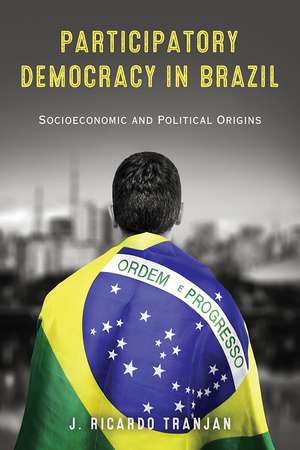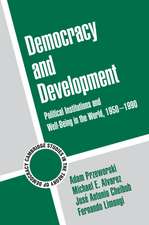Participatory Democracy in Brazil – Socioeconomic and Political Origins: Kellogg Institute Series on Democracy and Development
Autor J. Ricardo Tranjanen Limba Engleză Paperback – 16 dec 2015
The largely successful trajectory of participatory democracy in post-1988 Brazil is well documented, but much less is known about its origins in the 1970s and early 1980s. In Participatory Democracy in Brazil: Socioeconomic and Political Origins, J. Ricardo Tranjan recounts the creation of participatory democracy in Brazil. He positions the well-known Porto Alegre participatory budgeting at the end of three interrelated and partially overlapping processes: a series of incremental steps toward broader political participation taking place throughout the twentieth century; short-lived and only partially successful attempts to promote citizen participation in municipal administration in the 1970s; and setbacks restricting direct citizen participation in the 1980s. What emerges is a clearly delineated history of how socioeconomic contexts shaped Brazil’s first participatory administrations.
Tranjan first examines Brazil’s long history of institutional exclusion of certain segments of the population and controlled inclusion of others, actions that fueled nationwide movements calling for direct citizen participation in the 1960s. He then presents three case studies of municipal administrations in the late 1970s and early 1980s that foreground the impact of socioeconomic factors in the emergence, design, and outcome of participatory initiatives. The contrast of these precursory experiences with the internationally known 1990s participatory models shows how participatory ideals and practices responded to the changing institutional context of the 1980s. The final part of his analysis places developments in participatory discourses and practices in the 1980s within the context of national-level political-institutional changes; in doing so, he helps bridge the gap between the local-level participatory democracy and democratization literatures.
"In Participatory Democracy in Brazil: Socioeconomic and Political Origins, J. Ricardo Tranjan makes an important contribution to broader theoretical debates on political development. Rather than focusing on the now famous participatory budgeting program in Porto Alegre, he extends his analysis to better situate the emphasis on participatory democracy in a larger historical context. His corrective history will be of interest to scholars of participatory democracy, contemporary Brazilian social and political history, and democratic studies."
—Brian Wampler, professor of political science, Boise State University
Tranjan first examines Brazil’s long history of institutional exclusion of certain segments of the population and controlled inclusion of others, actions that fueled nationwide movements calling for direct citizen participation in the 1960s. He then presents three case studies of municipal administrations in the late 1970s and early 1980s that foreground the impact of socioeconomic factors in the emergence, design, and outcome of participatory initiatives. The contrast of these precursory experiences with the internationally known 1990s participatory models shows how participatory ideals and practices responded to the changing institutional context of the 1980s. The final part of his analysis places developments in participatory discourses and practices in the 1980s within the context of national-level political-institutional changes; in doing so, he helps bridge the gap between the local-level participatory democracy and democratization literatures.
"In Participatory Democracy in Brazil: Socioeconomic and Political Origins, J. Ricardo Tranjan makes an important contribution to broader theoretical debates on political development. Rather than focusing on the now famous participatory budgeting program in Porto Alegre, he extends his analysis to better situate the emphasis on participatory democracy in a larger historical context. His corrective history will be of interest to scholars of participatory democracy, contemporary Brazilian social and political history, and democratic studies."
—Brian Wampler, professor of political science, Boise State University
Din seria Kellogg Institute Series on Democracy and Development
-
 Preț: 222.01 lei
Preț: 222.01 lei - 19%
 Preț: 450.29 lei
Preț: 450.29 lei -
 Preț: 365.21 lei
Preț: 365.21 lei -
 Preț: 277.23 lei
Preț: 277.23 lei -
 Preț: 277.53 lei
Preț: 277.53 lei -
 Preț: 173.49 lei
Preț: 173.49 lei -
 Preț: 284.82 lei
Preț: 284.82 lei -
 Preț: 299.65 lei
Preț: 299.65 lei -
 Preț: 243.30 lei
Preț: 243.30 lei -
 Preț: 279.23 lei
Preț: 279.23 lei - 27%
 Preț: 701.59 lei
Preț: 701.59 lei -
 Preț: 162.65 lei
Preț: 162.65 lei -
 Preț: 221.38 lei
Preț: 221.38 lei -
 Preț: 216.16 lei
Preț: 216.16 lei -
 Preț: 180.06 lei
Preț: 180.06 lei -
 Preț: 157.58 lei
Preț: 157.58 lei -
 Preț: 232.16 lei
Preț: 232.16 lei - 15%
 Preț: 456.46 lei
Preț: 456.46 lei - 23%
 Preț: 591.49 lei
Preț: 591.49 lei -
 Preț: 276.55 lei
Preț: 276.55 lei - 23%
 Preț: 588.22 lei
Preț: 588.22 lei -
 Preț: 199.49 lei
Preț: 199.49 lei - 27%
 Preț: 699.35 lei
Preț: 699.35 lei -
 Preț: 280.96 lei
Preț: 280.96 lei -
 Preț: 367.12 lei
Preț: 367.12 lei - 27%
 Preț: 697.53 lei
Preț: 697.53 lei -
 Preț: 205.64 lei
Preț: 205.64 lei -
 Preț: 464.59 lei
Preț: 464.59 lei -
 Preț: 443.72 lei
Preț: 443.72 lei -
 Preț: 243.30 lei
Preț: 243.30 lei -
 Preț: 254.37 lei
Preț: 254.37 lei -
 Preț: 324.83 lei
Preț: 324.83 lei -
 Preț: 354.99 lei
Preț: 354.99 lei -
 Preț: 200.26 lei
Preț: 200.26 lei -
 Preț: 325.43 lei
Preț: 325.43 lei -
 Preț: 177.57 lei
Preț: 177.57 lei -
 Preț: 173.91 lei
Preț: 173.91 lei -
 Preț: 275.43 lei
Preț: 275.43 lei -
 Preț: 300.58 lei
Preț: 300.58 lei -
 Preț: 252.64 lei
Preț: 252.64 lei -
 Preț: 275.40 lei
Preț: 275.40 lei -
 Preț: 244.94 lei
Preț: 244.94 lei -
 Preț: 298.67 lei
Preț: 298.67 lei -
 Preț: 156.23 lei
Preț: 156.23 lei
Preț: 251.70 lei
Nou
Puncte Express: 378
Preț estimativ în valută:
48.16€ • 50.29$ • 39.86£
48.16€ • 50.29$ • 39.86£
Carte tipărită la comandă
Livrare economică 05-19 aprilie
Preluare comenzi: 021 569.72.76
Specificații
ISBN-13: 9780268042400
ISBN-10: 0268042403
Pagini: 288
Ilustrații: 1 line drawing; 3 tables
Dimensiuni: 155 x 229 x 20 mm
Greutate: 0.45 kg
Ediția:1
Editura: MR – University of Notre Dame Press
Seria Kellogg Institute Series on Democracy and Development
ISBN-10: 0268042403
Pagini: 288
Ilustrații: 1 line drawing; 3 tables
Dimensiuni: 155 x 229 x 20 mm
Greutate: 0.45 kg
Ediția:1
Editura: MR – University of Notre Dame Press
Seria Kellogg Institute Series on Democracy and Development
Notă biografică
J. Ricardo Tranjan is an independent scholar and a Toronto Urban Fellow.

















